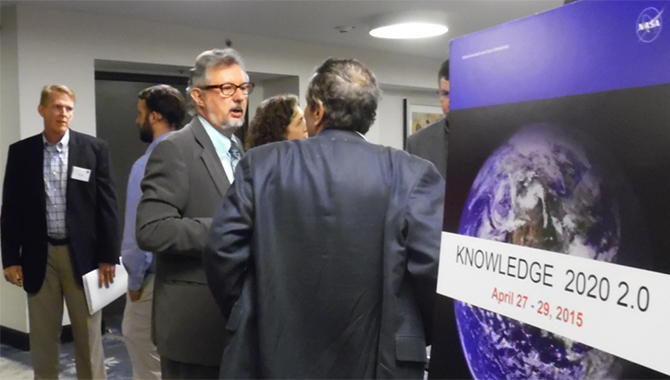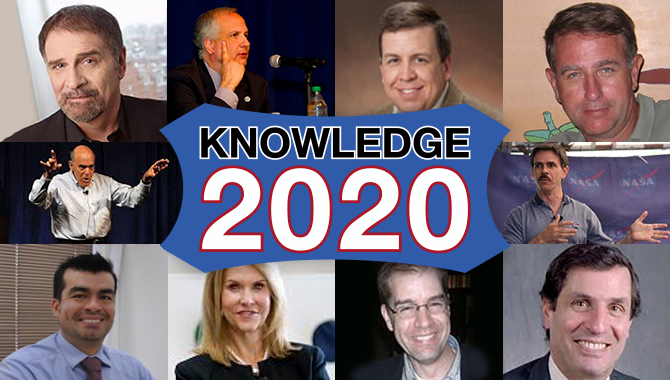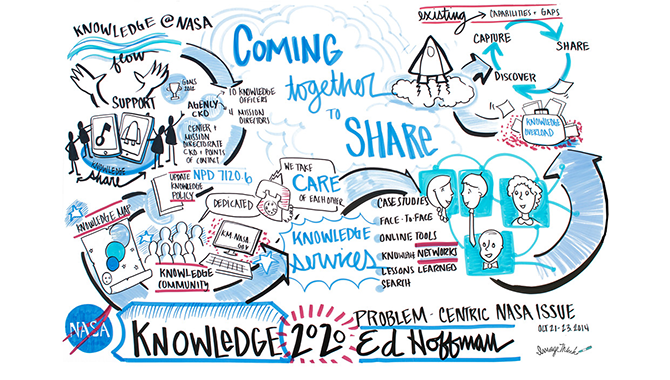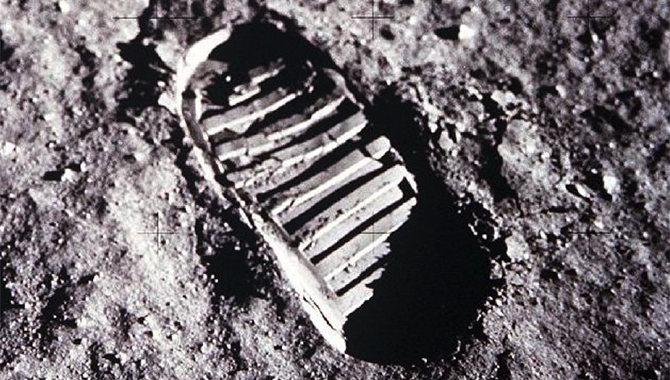
April 2015, Dan Ranta (far left), former Director of Knowledge Sharing, ConocoPhillips, and Jean-Claude Monney (center), Global Knowledge Management Lead, Microsoft Services, mingle with participants at the Welcome Reception of Knowledge 2020 2.0.
Photo Credit: NASA CKO
The NASA knowledge community built on the foundation of the first K2020.
Nearly 50 Knowledge Management and Services practitioners—from NASA and other highly technical organizations—came together for a knowledge sharing and problem-solving forum at Johnson Space Center (JSC), April 27 –29, 2015, the second offering of Knowledge 2020. The first “K2020” was held in October 2014 at Kennedy Space Center.
NASA’s CKO Ed Hoffman hosted “Knowledge 2020 2.0” to engage the NASA knowledge community members to help NASA benchmark other large and technical, federated organizations, and to meet the most recent Aerospace Safety Advisory Panel (ASAP) recommendations.
NASA leaders and fellow knowledge workers participated in knowledge sharing face-to-face activities, through presentation Q&A sessions, panel discussions, and round-table breakout working groups to develop real-life solutions to NASA’s biggest challenges. The conference content and context—whether presentation, interview, or breakout—related directly to NASA oversight organizations’ recommendations for effective knowledge sharing through process and procedural open integration and accelerated learning in sharing and applying lessons learned.
The three-day event began with a video presentation especially designed for the K2020 participants: Larry Prusak—founder of the IBM Institute for Knowledge Management and author of numerous articles and books—described how to sell KM solutions as big ideas within an organization. While reiterating the conventional approach that a good idea will sell itself, he stressed that even the best ideas need to be sold in a manner suited authentically in the manner in which advocates best present themselves and the ideas.
NASA Chief Engineer, Ralph Roe, also spoke to the K2020 participants via teleconference, addressing NASA’s goal of greater integration among knowledge services at the centers and across organizational boundaries. He stressed that the NASA workforce should know where to go and whom to ask to learn more about methods and activities for direct dialogue about lessons learned. The NASA Knowledge Network is key for knowledge programs at NASA.
Other speakers included leaders from industry, academia, and consulting services on leading practices. (Click on the title of their presentations to view a pdf.)
Marty Lipa, Executive Director and with Samantha Bruno, Associate Director, both of the Knowledge Management, Merck Manufacturing Division , updated participants on Merck’s progress since the last K2020 event in October 2014. “A Practical Approach to Managing Knowledge…2.0” updated Merck’s response to its historic growth and growing pressures through mapping knowledge flows, understanding networks, and executing concepts such as frameworks, stewardship, and business priority alignment.
Jean-Claude Monney, Global Knowledge Management Leader for Microsoft Services, shared his presentation, “Biggest KM Challenges”, describing “Need Not to Know” and “Working Out Loud” (and sharing a glimpse of the new Microsoft HoloLens).Tim Bridges, Director of Knowledge Management for Boeing, shared “Boeing Knowledge Management” and answered many question from K2020 participants on Knowledge Network, designated experts and “inSite” community of practice.
Ralph Basilio shared his experience at NASA, tied knowledge management, in his real life case study of “Truly Better the Second Time Around: The Application of OCO (Orbiting Carbon Observatory) Lessons on OCO-2”, which ended with mission success after an initial failure. Tony Luscher, professor of Aerospace Engineering at The Ohio University, gave a 1,000 foot prospective by speaking “Seven Axioms of Good Engineering (SAGE): Case Study Based Learning”, like Basilio, using real-life lessons learned to be infused in learning and processes.
During a panel interview led by Hoffman of two expert consultants, John McQuary, formerly Vice President for Knowledge Management and Technology Strategies at Fluor Corporation, and Dan Ranta, former Knowledge Management Lead at ConocoPhilips, both stressed how all knowledge practitioners need to think like a business and link their own goals to the organization’s strategic aims.
For greater details on the knowledge captured at the event, the K2020 2020 2.0 White Paper, “Facing the Knowledge Challenge” is now available online, written by Don Cohen, author and former editor of ASK Magazine. Cohen also spoke at the K2020 2.0 event, on the topic, “Failure is not an Option—It’s a Fact: Why Admitting Mistakes is Both Hard and Essential,” which reaffirmed the possibility of mistakes being beneficial, complete with examples like those now being shared through a new feature called, “My Best Mistake.”
Although the event targeted the initiation of technical solutions, such as search and online communities of practice, to meet ASAP recommendations, a softer theme rose above issues often grounded in technological innovation. All of the presenters at some point in their sharing underscored the value of cultivating personal networks, building trust, and developing a culture of responsibility to capture and transfer knowledge.
If you work for NASA as a civil servant or contractor and you are interested in participating at the next Knowledge 2020 event now being planned, please contact Susan Snyder or call 301-837-3918.
For a complete list of all presentations, please click here.








